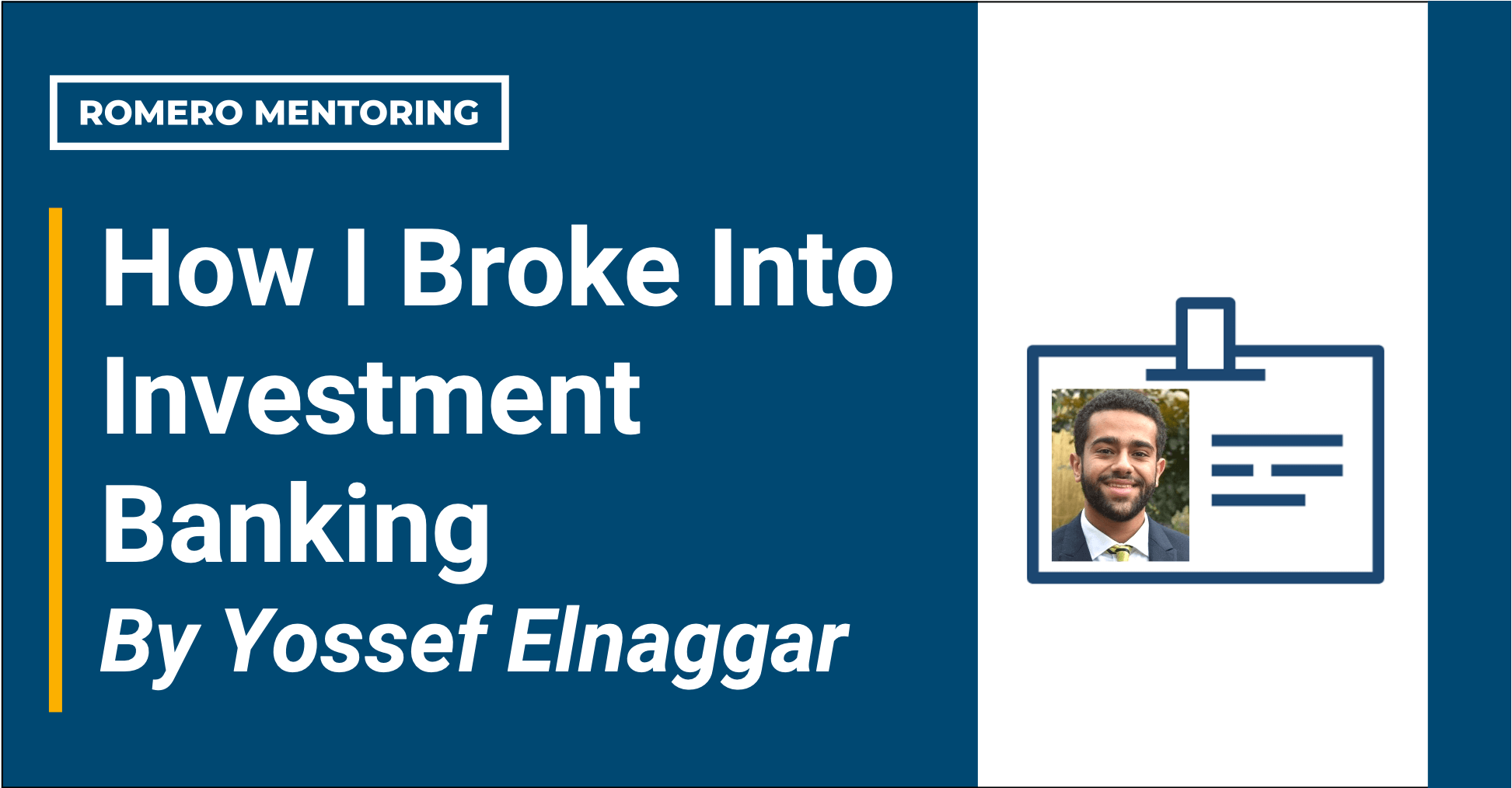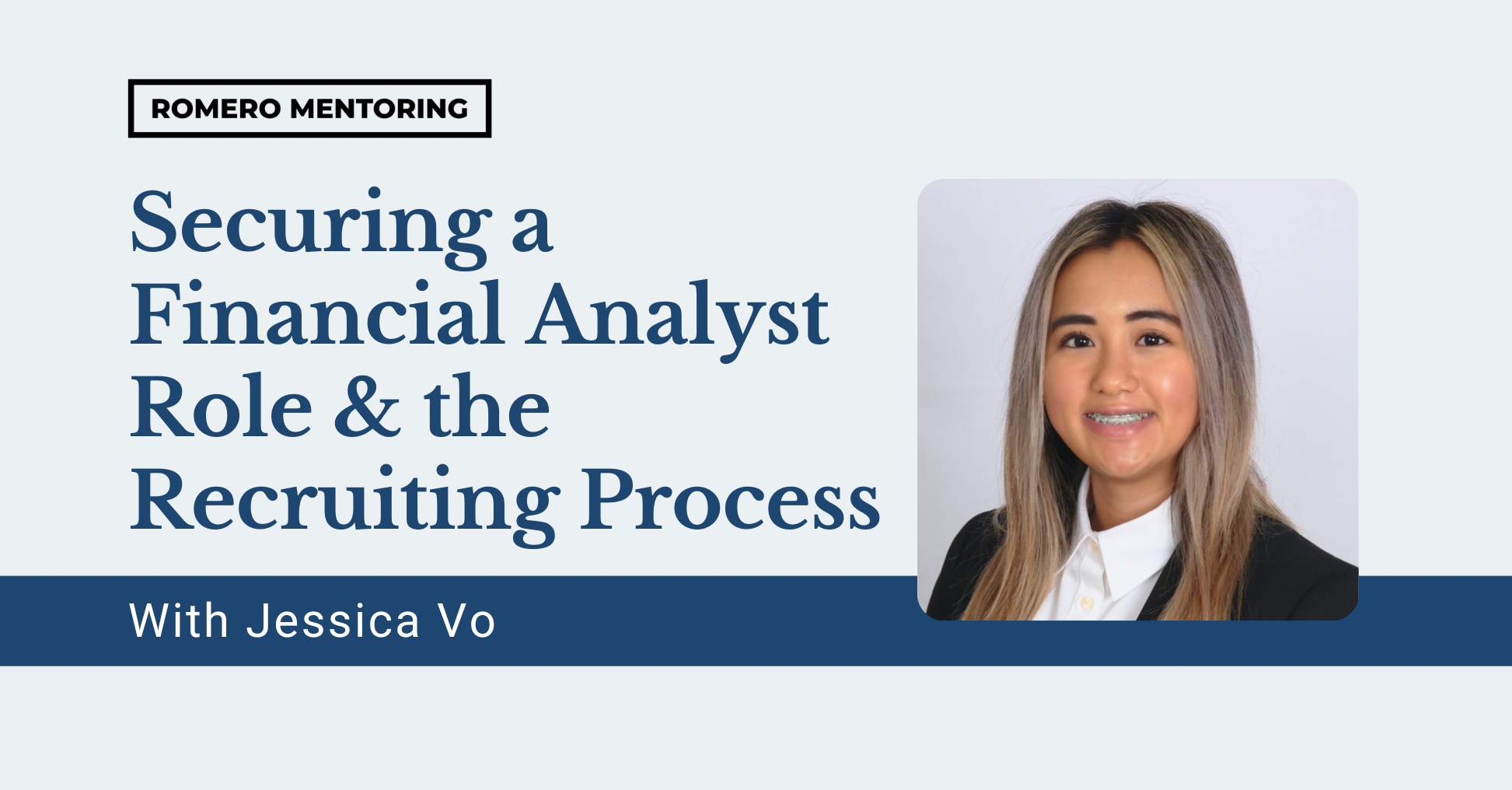Background
My name is Yossef Elnaggar, and I’m currently in the middle of my third year at Northeastern University. I grew up in a small suburban town right outside of Princeton, New Jersey. I am studying finance and accounting at the D’amore-McKim School of Business, largely due to my interest in applying creative judgement and analytical thinking to my day-to-day work life. Northeastern appealed to me because of its strong experiential learning program, as I have always been a more practical, hands-on learner. I completed my first co-op at PricewaterhouseCoopers on their assurance team and will be taking part in another co-op this spring semester on the investment banking team at Needham & Company.
While at Northeastern, I joined the Northeastern Student Value Fund, which really sparked my interest in banking. Prior to joining the fund, I wasn’t sure what I wanted to do within finance, but after talking with older fund members and gaining hands-on experience in financial modeling I knew this was the direction I wanted to go in. Heading into college, my main reservation about investment banking was the long hours. After my time at PwC, however, when I would routinely work long hours as a busy seasonal intern, I felt confident in my abilities to take the plunge into investment banking. The way I saw it, no other career path could provide me with the skillset, tools, and learning experiences that investment banking could. I also wanted exposure to technology, which has always been an interest of mine and why I ultimately accepted offers to work at Needham (who primarily works with growth tech companies) in the spring and Financial Technology Partners (who works with FinTech companies at various stages in their business cycle) over the summer.
In-School Preparation
While investment banking is generally perceived as a finance role, when it came to interview prepping my accounting classes ended up being the most important. A lot of the technical questions I was asked during interviews were related to accounting. During every interview, it is likely you will be asked about the three financial statements and how they connect, finding net income from revenue, or how a certain transaction impacts the financials of a company. Additionally, having a solid accounting baseline makes understanding financial concepts while you study for interviews (i.e., free cash flow calculations) much easier. I recommend taking as many accounting classes as possible, and I have found that adding it as a concentration in addition to finance has been incredibly helpful.
Outside of class, I suggest getting involved in a student finance club on campus. Not only will you get the opportunity to apply what you learn in the classroom, but you’ll also be able to network with and learn from your peers who may have already been through the recruiting process. They can provide referrals for certain internships and may have unique insights into the type of culture at a firm you may be interested in. I have found the work I do in the Student Value Fund at Northeastern to be very rewarding, both from the standpoint of gaining and applying technical skills and learning from upperclassmen.
Why Banking?
For me, going into banking was always about the learning experience. Not every 22 year old coming out of college — unless s/he goes into investment banking — gets to attend conference calls with C-suite executives, work on large deals, and analyze companies from their earliest capital raising stages to their exit sell-side M&A deals. Each client and each deal are unique, and analysts in the banking industry are constantly on their toes trying to solve complex problems to meet their client’s needs. Additionally, I genuinely enjoyed financial modeling as a member of the fund and during my time working with Mr. Luis Romero of Romero Mentoring. I wanted to apply these skills and further sharpen them, and investment banking offered me the opportunity to do so. Finally, after talking with members of the Student Value Fund and hearing about the experiences they had in banking (which included high levels of responsibility and meaningful work), I felt comfortable that the long hours of banking were in the end worth it and thus decided to apply for investment banking internships.
Because of Northeastern’s co-op program, I can work for four to six months during an academic semester as opposed to the standard 10-week summer internship. I applied to several investment banking co-ops for the spring cycle and ultimately decided to join Needham & Company in the spring. I liked their flat company culture, as having access to senior bankers will be a great learning experience for me as an intern. Furthermore, given that Needham is a boutique investment bank, I felt I would get more live deal exposure and do more meaningful work there than I would at a larger firm, where I felt I would be just “another cog in the wheel.” They also work on a large variety of deals (private placements, IPOs, sell-side M&As, etc.), which will provide a great opportunity for me to get exposure to each of them as opposed to being siloed in a single product or industry group. Finally, as stated earlier, I have always been interested in working with fast-growing, innovative companies with unique product/service offerings, and the Boston team at Needham works primarily with growth tech firms so I will benefit from learning about different tech-based business models while improving my technological literacy.
Because my co-op is expected to end in April/May, I decided it was best to continue recruiting for summer internship positions because I want to get as much exposure to the industry as I can before graduation. I had attended the FT Partners insight series over the summer and found the level of responsibility given to their analysts and the deal flow the firm was experiencing to be big draws. Additionally, I focused briefly on the FinTech space while working as an analyst at Romero Capital when I examined Square (NASDAQ: SQ) as a potential investment. That was one of my favorite projects during my time there, so working on the sell-side with FinTech companies appealed to me as well. I also knew that because FT has a strong reputation with FinTech companies and COVID-19 has helped a lot of their clients, I will be able to contribute meaningfully to live deals during my time there, which is a one-of-a-kind opportunity for an intern. The draws that I mentioned earlier of working at a boutique bank apply here as well. Since both positions are unique and fit what I am seeking from my internship experiences, I am incredibly excited for all I am slated to learn over the coming months.
Interview Preparation for Investment Banking
To prepare for interviews, I used the M&I 400 investment banking guide to run through the technical questions. I found that set of questions to be incredibly comprehensive. It is also important to look at behavioral guides that can be found online as well. Have a few stories ready about working on a team (in STAR format) that you can share. Also, be prepared to talk about every bullet point on your resume and how your experience has prepared you to succeed in that specific role.
One thing that interviewees often overlook when preparing for interviews are “the big three” questions that are almost guaranteed to be asked in any interview:
- Tell me about yourself.
- Why investment banking?
- Why this firm?
Candidates often get too caught up reviewing the technicals (which are important) and forget to prep for these three questions. Have your story down and ready to go for your interview (practice whenever you can). Research investment banking and the product/industry group you are interviewing for and have a clear-cut reason within your story as to why you are interested in each of these. Finally, explore the company website, learn about the deals they work on, and get a sense of what the company culture is like. I recommend having one of the company’s deals ready to walk through, as this is a question I have been asked in the past. Understanding what the company is all about will also prepare you to ask meaningful questions.
The most important thing I can say is do not be nervous. At the end of the day, bankers want to work with people who have a positive attitude and are fun. Tell your story, ask meaningful questions, and stay calm. Do not panic if you do not get a technical question right away; walk the interviewer through your thought process and remember that it isn’t essential that you get all of them 100% correct.
Final Tips
The recruiting process is long and grueling, from cold networking calls and emails through the long final rounds. Try your best to keep everything in perspective and to learn from each experience so that even if you do not get a specific job, you are better prepared for your next go-around. While it may be stressful and overwhelming at times (especially if you like to run through WSO as much as I do), remind yourself that an investment banking internship is not the end all be all like everyone makes it out to be. This will go a long way in making the process easier in all aspects.
About Romero Mentoring
Since 2016, Romero Mentoring investment banking training programs have been delivering career mentoring to job seekers, professionals, and college students pursuing careers in finance. We’ve helped over 500 students start their careers on Wall Street through our Analyst Prep and Associate Investment Banking Training Programs. Our graduates work at top-bulge bracket banks and consulting firms, including Goldman Sachs, JP Morgan, McKinsey, and many more.





